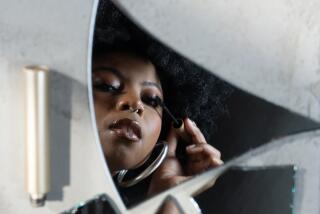Op-Ed: Black fabulousness, with hair and without it

- Share via
Here’s one positive outcome of Will Smith’s unhinged moment at the Oscars: It brought global attention to alopecia. And here’s another: Jada Pinkett Smith seems to have made peace with it. She wore her near-baldness intentionally, glamming it up at an event where the public gaze is about as intense as it gets. She winced at Chris Rock’s joke, but it didn’t undo her. She was fabulous.
Then there are us mere mortals. I too have alopecia. Sometimes I think it’s cosmic payback for being overly obsessed with image. My late husband said I loved the mirror too much. “You’re always looking at your hair,” he said, when he caught me in the act.
It’s true — I was always looking. First to make sure my hair was in decent shape, literally. Anything from donning a pullover sweater to a mild breeze can wreak havoc with curly hair. But I was also simply admiring my coppery-to-brown (lately green-tinged) ringlets.
I think Black women are fabulous by nature, and hair tops off the fabulousness. Hair is a crown, a kind of armor that helps you feel regal when you’re uncertain or undermined. This is true for me even if the mirror shows that the shape of my hair needs adjusting, that the curl is imperfect. The fabulous is still there. This is what I routinely look to the mirror to reaffirm.
A couple of months ago, a check of the back of my head froze me in horror. Out of nowhere a wide, circular bald patch had appeared. It looked like the result of a brush fire that overnight had consumed most of the side part that anchors my signature look. I gasped, my presumed fabulousness suddenly punctured.
At first I was frightened, then floored. Whatever else I might be lacking in life, my hair had always been abundant. Now I was operating from a deficit — distressing, though it’s a position all too familiar to Black people.
The dermatologist diagnosed alopecia areata, an autoimmune condition in which white blood cells attack hair follicles and the hair falls out. There’s no cure, but the hair tends to grow back, with treatment or without but not always, and the growing back can take time. The causes of alopecia are murky although every Google search about the condition mentions stress. Sometimes the hair loss is total, including body hair, brows and lashes. I’ve been lucky. So far, the brush fire has been contained.
When I was growing up, Black people intimated I was lucky because I was Creole and blessed with “good hair”— curly, but not kinky. Call it Black-ish.
As a teenager, I regretted that my hair was too white-girl to whip into a voluminous Afro, i.e. something fabulous. I tried cornrows but they unraveled overnight. My mother instituted a weekly wash-and-set on big rollers to smooth out the curls and make them more glamorous, a la Marilyn McCoo. But at the first sign of humidity my McCoo ’do reverted back to fineness and frizz.
In college, I decided to let my hair be. It worked. Whether short or long — I went through a moderate mohawk phase in the 1980s and had a latter-day Diana Ross mane in the ’90s — it was my natural hair, and that was statement enough. It was Black enough, armor enough.
Most importantly, it was me. My natural hair went a long way toward achieving my core goal as an adult: to look as fabulous as possible, with as little effort as possible. Good hair indeed.
Now? My faltering hair fails as a symbol of resilience — specifically, the resilience of Black beauty as historical and cultural forces worked to annihilate the very idea. The failure feels personal. Black women put their locks through a lot, but the hair itself endures, surviving manipulation and change. But not mine.
Obviously I’m not resilient, not worthy. All this time I‘ve only been passing as fabulous.
When I go out, I can’t decide how much I care about the public gaze, so I often wear hats. A good friend caught sight of the bald patch minutes into a recent (hatless) visit and blurted out, “What happened?” She was sympathetic, but her initial unhappy look lingered. I was rattled.
Going through airport security a couple of weeks ago I took off my beanie, and when the TSA agent got the wand up to my head she paused. “You can put your hat back on now,” she said quietly. She was white; I was mortified. Then I was mortified that I was mortified — to be brought low because of my hair, as if I were 15 again.
Three months on, I’m (still) waiting for new growth, or possibly more loss. Self-esteem, like sand in your hand, is hard to hold on to. Yet I don’t have much choice but to keep being myself. I don’t look great in hats, and besides, I want the 95% of my hair that I still have, and still admire, to reclaim center stage.
Meanwhile, I struggle daily with the deficit thinking endemic to Black people and intensified by my unreliable hair. Of course I know that Black fabulousness is interior. It’s not about hair, it’s about aesthetic and spiritual perseverance, defiance even, no matter what’s lost.
This is the true essence of being — not looking — fabulous. Pinkett Smith embodies it, and it’s what my mirror reflects on good days. I’ll look as many times as necessary, whether I’m checking my hair or not.
Erin Aubry Kaplan is a contributing writer to Opinion.
More to Read
A cure for the common opinion
Get thought-provoking perspectives with our weekly newsletter.
You may occasionally receive promotional content from the Los Angeles Times.










